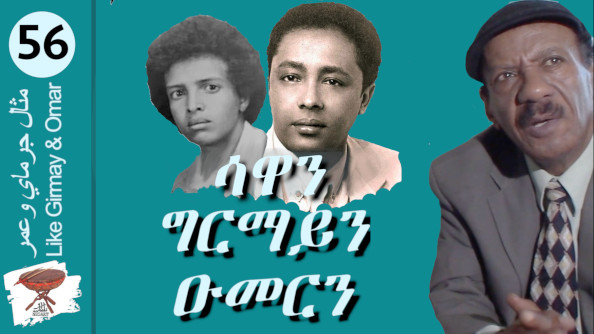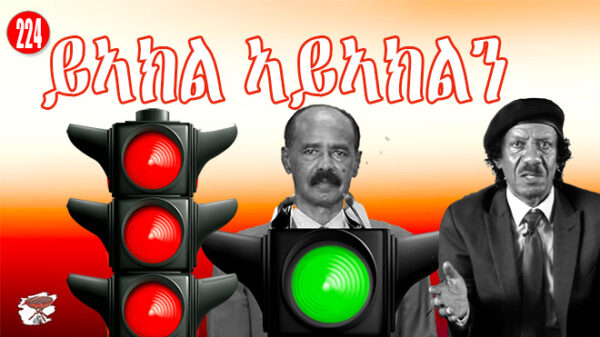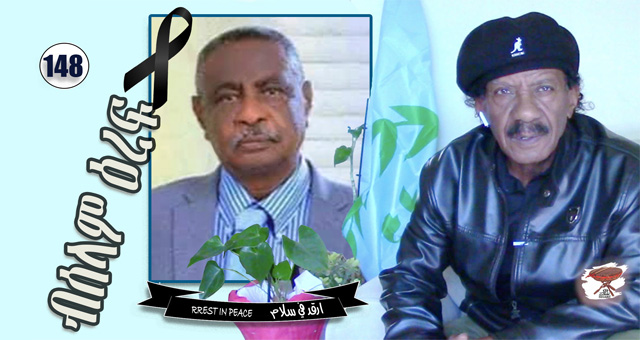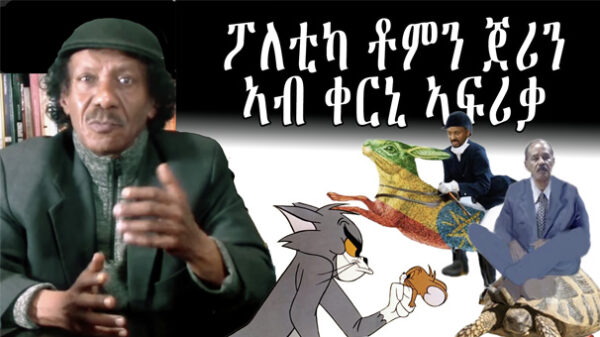Negarit 56: ሳዋን ግርማይን ዑመርን – Sawa Omar and Girmay -ساوا وجرماي و عمر
- Last week two great Eritreans departed. Omar Hassen Omran, was buried in Kessela, Sudan and Girmay Kidane, Wedi Philipo, was buried in Milano, Italy
- A word to the forces of good, particularly Eritreans
- “End and Means”, or Grabbing the neck and the process of reaching that goal
The tone of my last few videos was imposed on me, and if not, I would have liked to speak in a different tone. But as you know, sometimes we are pushed so much that a periodic response becomes necessary. By its nature, such speeches are unpleasant to listen to, let alone talk about, and that is why I am going out of my way to apologize to my listener beforehand.
In classrooms, a bully shouts something that annoys the teacher. The teacher turns back and asks, “who said that? Who said that?” No one would identify the culprit. The teacher gets mad and punished the entire class, “lekemeke.” The difference is that, when we identify the annoying individuals, demolishing their views requires offending others who had nothing to do with the nasty things that offends us. So, I hope you take it as a necessary evil, but for those who felt bad, I apologize.
As any other nation, we went through fragmentation, splits, and disunity of our own. But what we came to see in the last two or three years are exceptional—and by now we know the nature of the sickness and the forces that are promoting it. As Eritreans, we have been fighting evil intentions, each in his own capacity, but our hands are tied by the PFDJ which made our country a basket case–a country that rejects its people, a country that keeps our youth in bondage, a country that jails its elderly and veterans, a country that disrespects our elders, a country where bigots flourish, and a country in which the notion of justice is mishandled by our common enemy.
I believe that Eritrea is a lovely country and our people are decent, freedom loving, justice loving, and humble people. But as they say in Arabic, people imitate their leaders and we have many examples of that. We see them empowering the dictator and cheering for injustice, selfishly advancing their narrow interests at the expenses of the nation. So, what do we do?
If you remember, the last two decades have been a merry-go-around. Every time we took two steps forward, there were individuals who took us two steps back. Unnecessary issues were introduced and cleverly promoted inside the Diaspora opposition: once it was “peaceful or armed struggle”, then it was the 97 constitution or not, do we stay in Ethiopia or not, do we accept Sawa or not! All those clear issues were somehow trivialized and took us many steps back. For example, Sawa that my friend Adhanom loudly characterized as “Wefri Warsay Ykealo, Wefri Barenet” became an endless topic that we should have had clarity on. Why are we campaigning against Sawa (the manner not the principle) two decades after Adhanom clearly argued against it? If you see, some of the main themes we adopt in the struggle were introduced, went on hibernation, reintroduced, and reintroduced endlessly. The same with the Yiakl campaign.
A struggle like ours requires clarity and I think we lack clarity. I will try to explain some as I understand them.
If you are building a house, you lay the foundation and bring the wall, maybe one meter up and then you run out of funds and stop for a time. Once you get the money, you are supposed to continue where you left, not demolish what you already built. You just don’t dig down and unearth the foundation stones one by one to start laying another foundation. Why is it that 20 years later we are campaigning for our prisoners and we have not made a dent in the fight for their release?
You see, we have many celebrations around the year. Maalti sewra, maalti suwuat, maalti natsnet, maAlti Fenqil, maAlti Esurat, Maalti Togoruba, etc. We spend weeks preparing for one event, we celebrate for a week, then we start to prepare for the next one, and we spent the year planning, celebrating and then going into planning for the next one. It’s a merry-go-around.
To get out of the vicious circle, I propose the following:
- We should stop, not repeat, political campaign to win grownups. Those who chose to side with the dictator are doing it consciously, we should not waste our time on them, we fight them just like we are fighting the regime.
- We shouldn’t dream of winning 100% of the diaspora to line up against the tyrannical regime, it never happened before and it will never happen now. March ahead with what you have—a dedicated, focused, persistent few are more effective than a crowd of cynics, half believing elements, doubters, and opportunists.
- We should remember the diaspora is just a catalyst, nothing more. The real stakeholders are inside Eritrea and its vicinity. Focus on them—campaigns focused on the diaspora is not the main struggle.
- We should believe the Eritrean Defense Forces are supposed to be a national force, and it should not be treated, or seen, as a PFDJ militia—this message should be clearly communicated to the EDF.
- Every one of us has distinct skills and abilities and we should identify those and be involved only where our skill will have an impact. Jack of all trade is not for everybody—if someone is passionate about prisoners, let them get together with like-minded individuals and focus of that—and periodically measure their accomplishment. You can’t switch from prisoner advocacy, to diplomacy, to organizational tasks, to nation building, hopping from one to another all at the same time. That will help us produce experts, specialized individuals who would do the job effectively.
- Our messages should be tailor made to appeal to Eritreans inside Eritrea. Whatever we do, we should remember our audience are the common Eritreans (except for those who choose to appeal to other segments or professional class inside Eritrea). So, all our message should not be cluttered with feel-good slogans that cannot inspire the people. For example, how many Eritreans are worried about the constitution, democracy, and all the good sounding slogans? Very few. However, if we scream for Justice, Fithi, Adaala, then every Eritrean in every corner of our country will identify with it—the rest is only a by-product of justice—or can be left to the experts to handle.
- Social media—some accounts are just a burden, an annoyance and a waste of time. Everyone who is not for Eritrea, and is against the principles for which Eritreans are fighting, should be kicked out of our lists, friends, etc. Why offer them a platform to sow seeds of discord among the dedicated opposition camp? Some would say, we keep them to know how they are thinking! Okay, form an intelligence group that would monitor their actions, but do not invite them to your walls or keep them there to spew venom.
- Meetings and celebration. WE should try to make our meetings more professional a) no meeting should take more than 3-hour max. even the nuclear negotiations between nations doesn’t take that long—iron-out the details before the meeting, which should only be held to formalize whatever was reached. Not every attendant in a 150 people meeting needs to spend ten minutes each on questions and views.
- Charity begins at home—anyone can have a cause they advance, but the mainstream movement (struggle) should have a national face, a national goal, a national character, and a national composure. Charity begins at home: if you are a serious opposition to injustice, be just, be honest, be dedicated, and shun all individual interests and focus on national issues.
Last week lost two exemplary people
Omer Hassen Omran: He was my junior, but age doesn’t matter with Omer. He is probably the bravest boy I knew, and many Kerenites who knew him would attest to that.
Omer Hassen Omran. Many people thought he was the son of Ustaz Omran, the loved librarian of our school. But he was the son of Hassen, Ustaz Omran’s brother. His father was out of town most of the time and when he was in town, he spent his time at Farmacia Bruno or, sipping coffee at Bar Senait (enda Aregai for the young). Omer would come to that area regularly as if he had a daily mission to accomplish; his pocket would be full of stones. He immediately started a lookout for Torserawit soldiers in the streets. When he sees one or two, he would provoke them with dirty looks, spit on them, or shout at them. The bewildered look at him: how is it this kid has the guts to do that? The soldiers would try to scare him off by walking towards him. He fishes a stone from his pocket and pelts them. He would boldly pelt them with stones and chase them away from the street—they run away as children. The soldiers would think: of course, he must have had some older people behind him otherwise he wouldn’t do what he was doing.
Many people complained to Ustaz Omran and his father to reign over Omar less someone kills him. But nothing reigns on Omer. I once heard his father hopelessly say, “Batir Sheheed tu” he is a “walking martyr” an incident of martyrdom waiting to happen.
One time a squad of Torserawit held him and started to beat him up. The squad had two commandis member, one of them was a young soldier named Kidane (I wish he is alive and kicking, a good friend of mine) The two commandis interfered to stop them from beating up Omar, they confronted the Tor Serawit and their squad leader Sergeant Mokria. It got so serious they cocked their guns at each other. Kidane and his friend didn’t blink, and they managed to free Omer.
Kidane was transferred and taken off the squad; I met him a long time later. He asked me, “anta etti ambessa wedi, EEmer, abelo?” I said, “k em amelu, chasing tor serawit in the usual place.” Soon I left Keren, Omar, and Kidane. Omer is gone and I hope Kidane the best hoping he is still alive.
Girmay Kidane “Wedi Filipo”: This week we also lost Wedi Philipo, Girmay Kidane, the walking encyclopedia who inspired so many people. Girmay, despite his age and health, never stopped inspiring the justice camp, always advising, teaching, and narrating important milestones of our Eritrean struggle. I feel sorry I didn’t know him more except for a few conversations over the telephone. But I read all his articles, heard many of his speeches, and felt jealous on how he boldly narrated relevant history. Girmay was probably the most knowledgeable person who talked about the PFDJ “capo di capi”. That is because he knew him from their childhood days in Asmara, and he followed his activities through and through until he died. His views were helpful because he would relate Isaias’ present to his past in a convincing way. Girmay was sick for a short time and died in Italy—may he be accepted into paradise. Allah Yerhamu, Bselam Eref ayana Girmay.
The rest of us, may we inherit the characters of the two people I mentioned today: Omer Hassen Emran and Girmay Kidane Wedi Philipo. Their character is something we need to honor, and we have two traits to emulate: either be bold like Omar, or be truthful and honest like Girmay—the dictatorship in our beloved country has overstayed its time. It should be uprooted.





Awate Forum